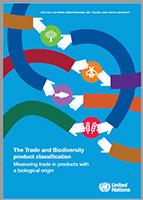
Today, nearly one million species are threatened with extinction (IPBES, 2019), sea levels are rising, ocean acidification is accelerating, and the past seven years are set to become the warmest on record (United Nations, 2021). The world is facing a biodiversity crisis with deep implications.
In order to mitigate this crisis and achieve the Convention on Biological Diversity’s (CBD) goal of Living in harmony with nature, stark transformational changes must urgently take place.
UNCTAD developed the Trade and Biodiversity (TraBio) statistical tool and related TraBio product classification with the aim to support UNCTAD member States and other stakeholders by providing public access to consistent, comparable, and comprehensive trade data related to products issued from biodiversity.
This effort was undertaken according to the CBD’s 1992 definition of biodiversity that includes the entirety of life on earth – from animals, to plants, including fungi, micro-organisms, the genetic variety within species and all different ecosystems.
The TraBio statistical tool and product classification will facilitate the gathering, analysis, monitoring and reporting of information related to trade in biodiversity-based goods, and thus enable a better understanding of the economic benefits and contribution of biodiversity and the trade of biodiversity-based products.
This work is the first step towards the definition of a common methodology related to the collection and presentation of biodiversity-related trade data. Its goal is to enhance the comparability of results across different applications, such as research or policy, and thus facilitate collaborative efforts and the identification of potential synergies.
In the long-run, this work aims to establish a universally recognised standard product classification for the analysis of trade in biodiversity-based goods.


